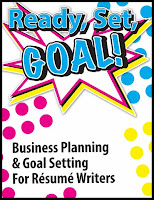 For most self-employed folks, business plans are an essential element to starting and running a successful business. It doesn't matter if your business is large, small, online or offline — having a solid business plan is a key indicator of future success. The part of the business plan that is helpful is that a business owner is forced to study the market, develop products and/or services for that market, and then use the figures discovered to determine in advance whether or not the idea has a chance of success. You can also benchmark your progress against your business plan. I love the phrase, "What gets measured, gets done." If you're projecting $4,000 in revenues this month for your resume writing business, and it's November 14 and you're only at $1,300, you know you have some work to do!
For most self-employed folks, business plans are an essential element to starting and running a successful business. It doesn't matter if your business is large, small, online or offline — having a solid business plan is a key indicator of future success. The part of the business plan that is helpful is that a business owner is forced to study the market, develop products and/or services for that market, and then use the figures discovered to determine in advance whether or not the idea has a chance of success. You can also benchmark your progress against your business plan. I love the phrase, "What gets measured, gets done." If you're projecting $4,000 in revenues this month for your resume writing business, and it's November 14 and you're only at $1,300, you know you have some work to do!What Should Be In Your Business Plan
Believe it or not, you can write a one-page business plan that will be effective. I'd recommend adding a bit more detail, but starting somewhere is critical.
Your business plan should include the following components and cover 3 to 5 years of projections:
- Executive Summary. This is first, but it's written last because it is simply a summary of all the major points below. This usually covers less than two pages. For some small resume writing businesses, this one page is enough to help you get started on the right foot.
- Company Overview and Description. Describe your company's mission, unique differentiators, and the opportunity you are filling. Describe what gives your company an advantage, and describe everything you can about management and operations.
- Market Analysis. Include a study of your competition, describe your customers and your industry as a whole, and how your business will measure up to each area that you cover. This is where you identify your target audience down to a specific persona. (Sign up to receive the "Profile of a Professional Resume Writer" special report for some competitive data to use in your market analysis.)
- Service or Product Descriptions. Detailed descriptions of the resume services you will provide (updates, new resume development, LinkedIn profiles, bios, cover letters, etc.) and products you will sell (ebooks, membership programs, DIY courses, etc.). Describe your products and/or services and who exactly will be using them.
- Sales and Marketing Strategy. How will you get the word out to potential clients? Describe in detail each and every aspect of sales and marketing, including what type of payment systems you will use (merchant account? PayPal? Shopping cart software? Authorize.net?). Also describe how you will market, such as via social media, print advertising, television and more. The little details matter!
- Financial Review and Projections. Your current finances should be included, such as your income statement, balance sheet, cash flow statement, and budget. You should also include probable income projections based on projected future sales.
- Plan of Action. Include a step-by-step plan of action to make each of your objectives and goals come to fruition. Including a time line of actions is helpful. Start from the projected date of opening and work your way backwards until today to create a realistic plan.
If you're looking for a great resource for business planning and goal setting for your resume writing business, check out "Ready, Set, Goal: Business Planning and Goal Setting for Resume Writers."



